Herder and his summer pasture transfer in NW China's Xinjiang
新華網(wǎng)
Editor: huaxia
2025-06-17 09:07:55
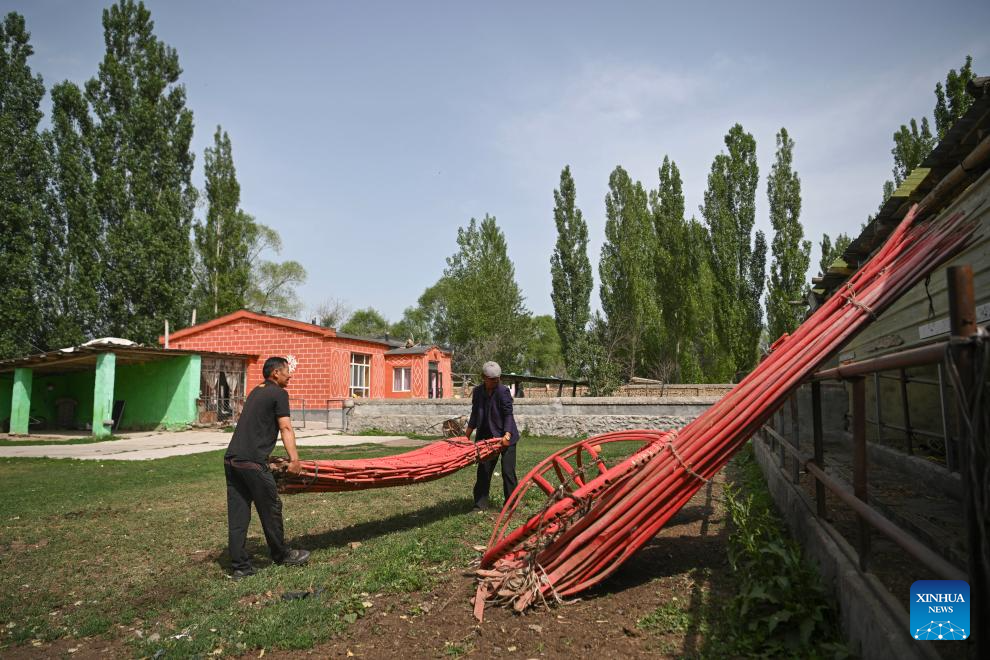
Balatijan Eremubai (L) and a neighbor move a part of a yurt in Xinyuan County, northwest China's Xinjiang Uygur Autonomous Region, June 10, 2025, the first day of summer transfer. Xinjiang, home to lush pastures, is one of China's key livestock production base. The Ili River Valley on the northern slopes of the Tianshan Mountains boasts abundant grassland resources. Every June, local herders took their livestock to summer pastures at higher altitudes where grass is abundant.
Balatijan Eremubai, a 43-year-old herder, lives with his family in a village in Narat Township of Xinyuan County. As this year's summer transfer comes, Balatijan made good preparations. In the past, horses were the main form of transport for the herdsmen and their belongings, but for now driving vehicles makes the journey easier and quicker. Balatijan drove vehicles to transport belongings and his family members to the summer pasture only in two days. And he can focus on driving sheep on the third day in a traditional way.
Vehicles using facilitates the life of the herders. Meanwhile the improvement of the infrastructure in the pastoral areas has brought continuous benefits to their daily lives. At the settlement built up for herders, medical, educational and cultural services are also available.
The three-day journey was arduous, but Balatijan said such works were worthwhile. And he is confident about this year's income. (Xinhua/Hu Huhu)
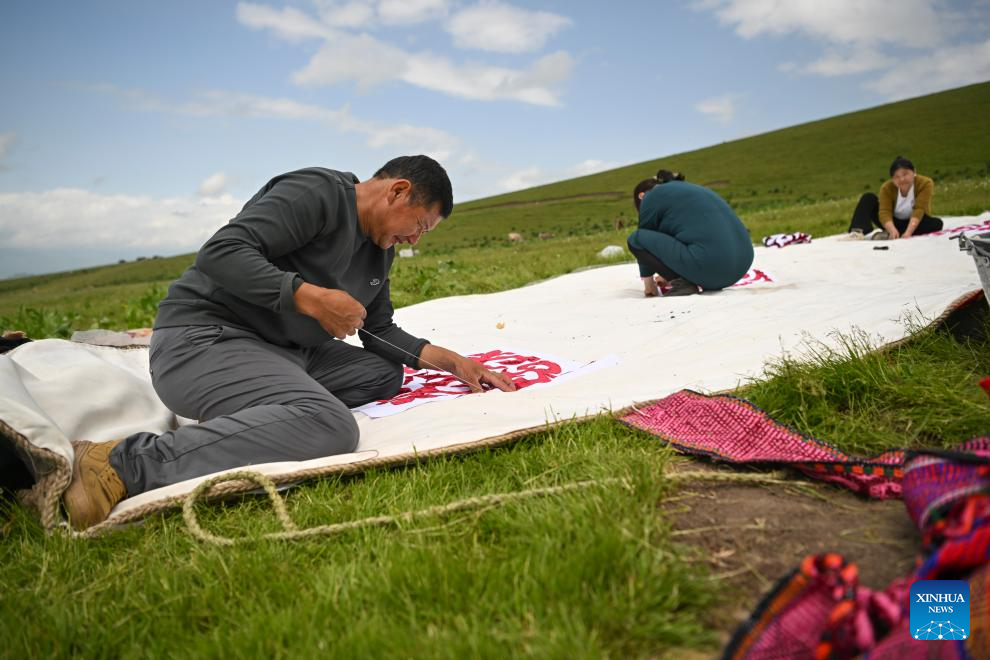
Balatijan Eremubai (L), his wife (R) and his brother's wife make decorations on a yurt on the summer pasture in Xinyuan County, northwest China's Xinjiang Uygur Autonomous Region, June 11, 2025, the second day of summer transfer. Xinjiang, home to lush pastures, is one of China's key livestock production base. The Ili River Valley on the northern slopes of the Tianshan Mountains boasts abundant grassland resources. Every June, local herders took their livestock to summer pastures at higher altitudes where grass is abundant.
Balatijan Eremubai, a 43-year-old herder, lives with his family in a village in Narat Township of Xinyuan County. As this year's summer transfer comes, Balatijan made good preparations. In the past, horses were the main form of transport for the herdsmen and their belongings, but for now driving vehicles makes the journey easier and quicker. Balatijan drove vehicles to transport belongings and his family members to the summer pasture only in two days. And he can focus on driving sheep on the third day in a traditional way.
Vehicles using facilitates the life of the herders. Meanwhile the improvement of the infrastructure in the pastoral areas has brought continuous benefits to their daily lives. At the settlement built up for herders, medical, educational and cultural services are also available.
The three-day journey was arduous, but Balatijan said such works were worthwhile. And he is confident about this year's income. (Xinhua/Hu Huhu)
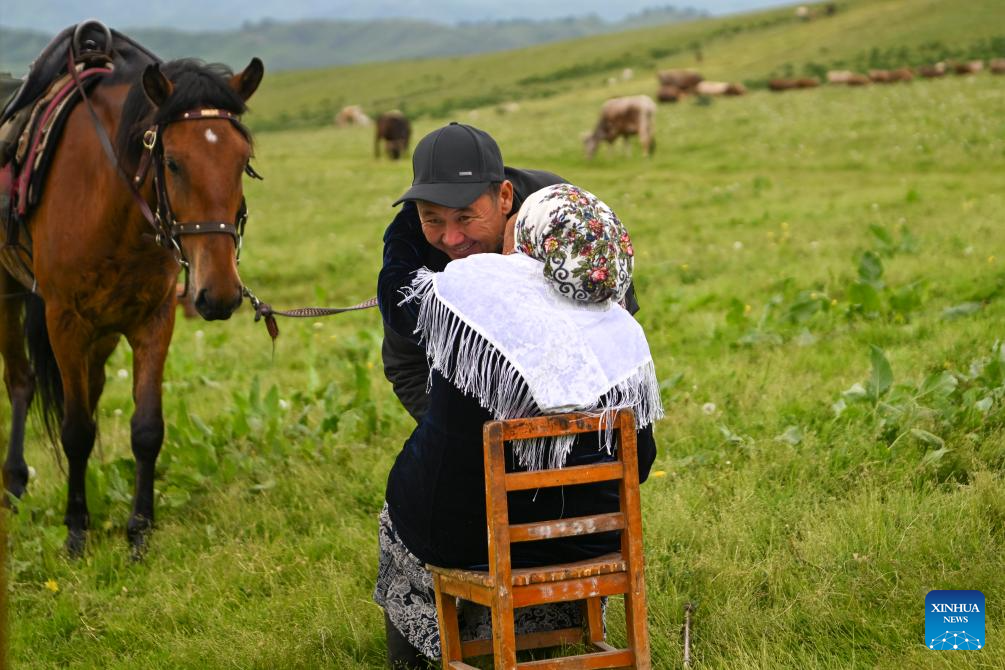
Balatijan Eremubai is hugged by his mother as he arrives the summer pasture on horseback with his sheep in Xinyuan County, northwest China's Xinjiang Uygur Autonomous Region, June 12, 2025, the third day of summer transfer. Xinjiang, home to lush pastures, is one of China's key livestock production base. The Ili River Valley on the northern slopes of the Tianshan Mountains boasts abundant grassland resources. Every June, local herders took their livestock to summer pastures at higher altitudes where grass is abundant.
Balatijan Eremubai, a 43-year-old herder, lives with his family in a village in Narat Township of Xinyuan County. As this year's summer transfer comes, Balatijan made good preparations. In the past, horses were the main form of transport for the herdsmen and their belongings, but for now driving vehicles makes the journey easier and quicker. Balatijan drove vehicles to transport belongings and his family members to the summer pasture only in two days. And he can focus on driving sheep on the third day in a traditional way.
Vehicles using facilitates the life of the herders. Meanwhile the improvement of the infrastructure in the pastoral areas has brought continuous benefits to their daily lives. At the settlement built up for herders, medical, educational and cultural services are also available.
The three-day journey was arduous, but Balatijan said such works were worthwhile. And he is confident about this year's income. (Xinhua/Hu Huhu)

Balatijan Eremubai (L) and his brother build a yurt on the summer pasture in Xinyuan County, northwest China's Xinjiang Uygur Autonomous Region, June 11, 2025, the second day of summer transfer. Xinjiang, home to lush pastures, is one of China's key livestock production base. The Ili River Valley on the northern slopes of the Tianshan Mountains boasts abundant grassland resources. Every June, local herders took their livestock to summer pastures at higher altitudes where grass is abundant.
Balatijan Eremubai, a 43-year-old herder, lives with his family in a village in Narat Township of Xinyuan County. As this year's summer transfer comes, Balatijan made good preparations. In the past, horses were the main form of transport for the herdsmen and their belongings, but for now driving vehicles makes the journey easier and quicker. Balatijan drove vehicles to transport belongings and his family members to the summer pasture only in two days. And he can focus on driving sheep on the third day in a traditional way.
Vehicles using facilitates the life of the herders. Meanwhile the improvement of the infrastructure in the pastoral areas has brought continuous benefits to their daily lives. At the settlement built up for herders, medical, educational and cultural services are also available.
The three-day journey was arduous, but Balatijan said such works were worthwhile. And he is confident about this year's income. (Xinhua/Hu Huhu)
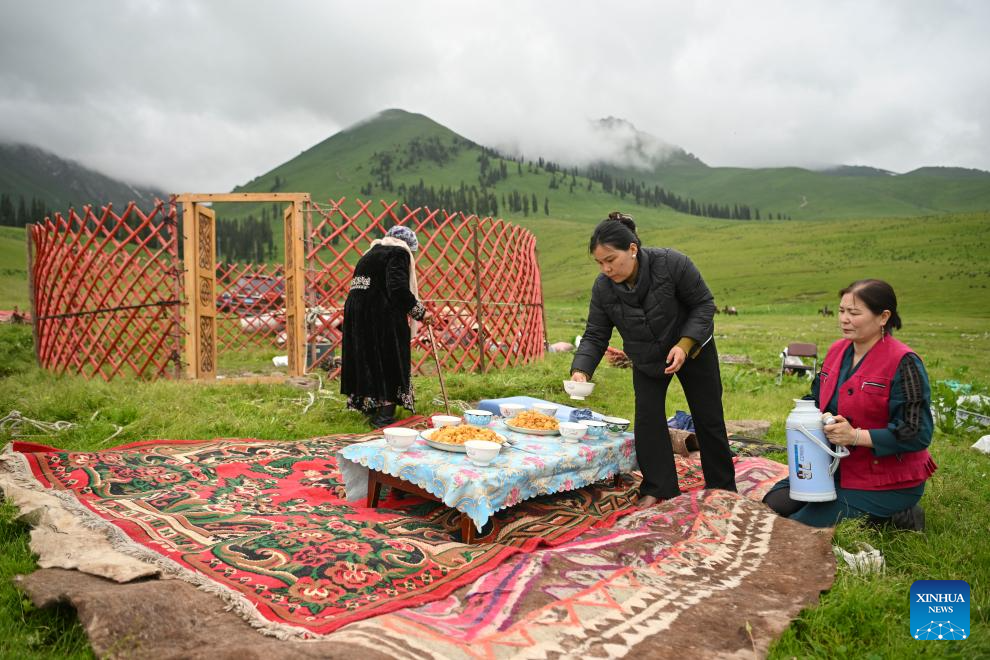
Balatijan Eremubai's wife (C) and his brother's wife prepare food on the summer pasture in Xinyuan County, northwest China's Xinjiang Uygur Autonomous Region, June 11, 2025, the second day of summer transfer. Xinjiang, home to lush pastures, is one of China's key livestock production base. The Ili River Valley on the northern slopes of the Tianshan Mountains boasts abundant grassland resources. Every June, local herders took their livestock to summer pastures at higher altitudes where grass is abundant.
Balatijan Eremubai, a 43-year-old herder, lives with his family in a village in Narat Township of Xinyuan County. As this year's summer transfer comes, Balatijan made good preparations. In the past, horses were the main form of transport for the herdsmen and their belongings, but for now driving vehicles makes the journey easier and quicker. Balatijan drove vehicles to transport belongings and his family members to the summer pasture only in two days. And he can focus on driving sheep on the third day in a traditional way.
Vehicles using facilitates the life of the herders. Meanwhile the improvement of the infrastructure in the pastoral areas has brought continuous benefits to their daily lives. At the settlement built up for herders, medical, educational and cultural services are also available.
The three-day journey was arduous, but Balatijan said such works were worthwhile. And he is confident about this year's income. (Xinhua/Hu Huhu)

Balatijan Eremubai (R), and his brother move past a tent during their way to the summer pasture in Xinyuan County, northwest China's Xinjiang Uygur Autonomous Region, June 12, 2025, the third day of summer transfer. Xinjiang, home to lush pastures, is one of China's key livestock production base. The Ili River Valley on the northern slopes of the Tianshan Mountains boasts abundant grassland resources. Every June, local herders took their livestock to summer pastures at higher altitudes where grass is abundant.
Balatijan Eremubai, a 43-year-old herder, lives with his family in a village in Narat Township of Xinyuan County. As this year's summer transfer comes, Balatijan made good preparations. In the past, horses were the main form of transport for the herdsmen and their belongings, but for now driving vehicles makes the journey easier and quicker. Balatijan drove vehicles to transport belongings and his family members to the summer pasture only in two days. And he can focus on driving sheep on the third day in a traditional way.
Vehicles using facilitates the life of the herders. Meanwhile the improvement of the infrastructure in the pastoral areas has brought continuous benefits to their daily lives. At the settlement built up for herders, medical, educational and cultural services are also available.
The three-day journey was arduous, but Balatijan said such works were worthwhile. And he is confident about this year's income. (Xinhua/Hu Huhu)
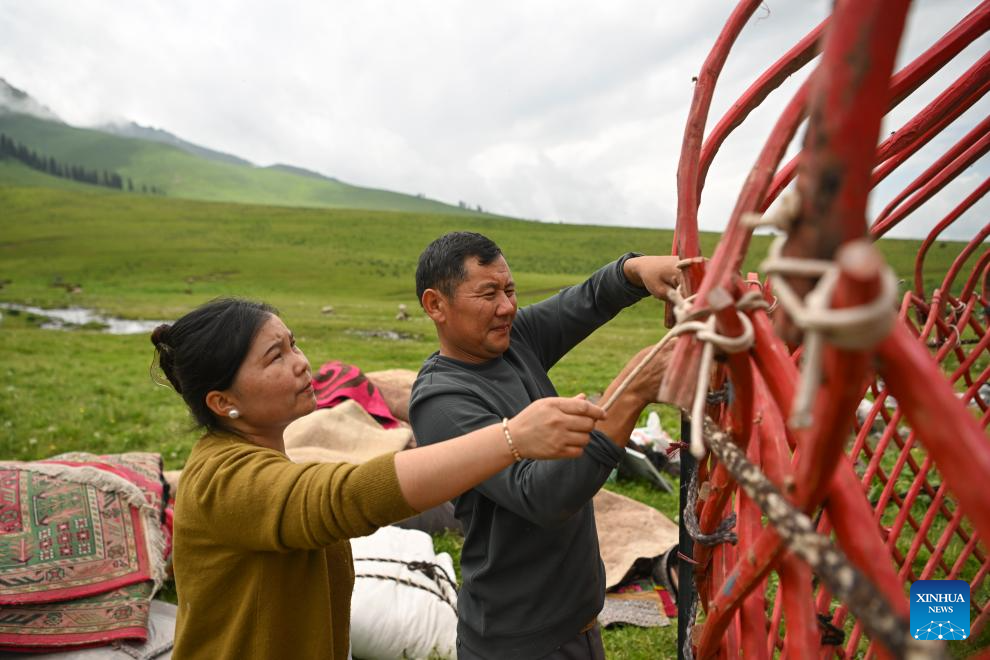
Balatijan Eremubai (L) and his wife build a yurt on the summer pasture in Xinyuan County, northwest China's Xinjiang Uygur Autonomous Region, June 11, 2025, the second day of summer transfer. Xinjiang, home to lush pastures, is one of China's key livestock production base. The Ili River Valley on the northern slopes of the Tianshan Mountains boasts abundant grassland resources. Every June, local herders took their livestock to summer pastures at higher altitudes where grass is abundant.
Balatijan Eremubai, a 43-year-old herder, lives with his family in a village in Narat Township of Xinyuan County. As this year's summer transfer comes, Balatijan made good preparations. In the past, horses were the main form of transport for the herdsmen and their belongings, but for now driving vehicles makes the journey easier and quicker. Balatijan drove vehicles to transport belongings and his family members to the summer pasture only in two days. And he can focus on driving sheep on the third day in a traditional way.
Vehicles using facilitates the life of the herders. Meanwhile the improvement of the infrastructure in the pastoral areas has brought continuous benefits to their daily lives. At the settlement built up for herders, medical, educational and cultural services are also available.
The three-day journey was arduous, but Balatijan said such works were worthwhile. And he is confident about this year's income. (Xinhua/Hu Huhu)

Balatijan Eremubai (L) drives sheep to leave the spring-autumn pasture in Xinyuan County, northwest China's Xinjiang Uygur Autonomous Region, June 12, 2025, the third day of summer transfer. Xinjiang, home to lush pastures, is one of China's key livestock production base. The Ili River Valley on the northern slopes of the Tianshan Mountains boasts abundant grassland resources. Every June, local herders took their livestock to summer pastures at higher altitudes where grass is abundant.
Balatijan Eremubai, a 43-year-old herder, lives with his family in a village in Narat Township of Xinyuan County. As this year's summer transfer comes, Balatijan made good preparations. In the past, horses were the main form of transport for the herdsmen and their belongings, but for now driving vehicles makes the journey easier and quicker. Balatijan drove vehicles to transport belongings and his family members to the summer pasture only in two days. And he can focus on driving sheep on the third day in a traditional way.
Vehicles using facilitates the life of the herders. Meanwhile the improvement of the infrastructure in the pastoral areas has brought continuous benefits to their daily lives. At the settlement built up for herders, medical, educational and cultural services are also available.
The three-day journey was arduous, but Balatijan said such works were worthwhile. And he is confident about this year's income. (Xinhua/Hu Huhu)

Balatijan Eremubai (3rd L) and his family have a meal on the summer pasture in Xinyuan County, northwest China's Xinjiang Uygur Autonomous Region, June 11, 2025, the second day of summer transfer. Xinjiang, home to lush pastures, is one of China's key livestock production base. The Ili River Valley on the northern slopes of the Tianshan Mountains boasts abundant grassland resources. Every June, local herders took their livestock to summer pastures at higher altitudes where grass is abundant.
Balatijan Eremubai, a 43-year-old herder, lives with his family in a village in Narat Township of Xinyuan County. As this year's summer transfer comes, Balatijan made good preparations. In the past, horses were the main form of transport for the herdsmen and their belongings, but for now driving vehicles makes the journey easier and quicker. Balatijan drove vehicles to transport belongings and his family members to the summer pasture only in two days. And he can focus on driving sheep on the third day in a traditional way.
Vehicles using facilitates the life of the herders. Meanwhile the improvement of the infrastructure in the pastoral areas has brought continuous benefits to their daily lives. At the settlement built up for herders, medical, educational and cultural services are also available.
The three-day journey was arduous, but Balatijan said such works were worthwhile. And he is confident about this year's income. (Xinhua/Hu Huhu)

Balatijan Eremubai takes a rest and has some food during his way to summer pasture, in Xinyuan County, northwest China's Xinjiang Uygur Autonomous Region, June 12, 2025, the third day of summer transfer. Xinjiang, home to lush pastures, is one of China's key livestock production base. The Ili River Valley on the northern slopes of the Tianshan Mountains boasts abundant grassland resources. Every June, local herders took their livestock to summer pastures at higher altitudes where grass is abundant.
Balatijan Eremubai, a 43-year-old herder, lives with his family in a village in Narat Township of Xinyuan County. As this year's summer transfer comes, Balatijan made good preparations. In the past, horses were the main form of transport for the herdsmen and their belongings, but for now driving vehicles makes the journey easier and quicker. Balatijan drove vehicles to transport belongings and his family members to the summer pasture only in two days. And he can focus on driving sheep on the third day in a traditional way.
Vehicles using facilitates the life of the herders. Meanwhile the improvement of the infrastructure in the pastoral areas has brought continuous benefits to their daily lives. At the settlement built up for herders, medical, educational and cultural services are also available.
The three-day journey was arduous, but Balatijan said such works were worthwhile. And he is confident about this year's income. (Xinhua/Hu Huhu)
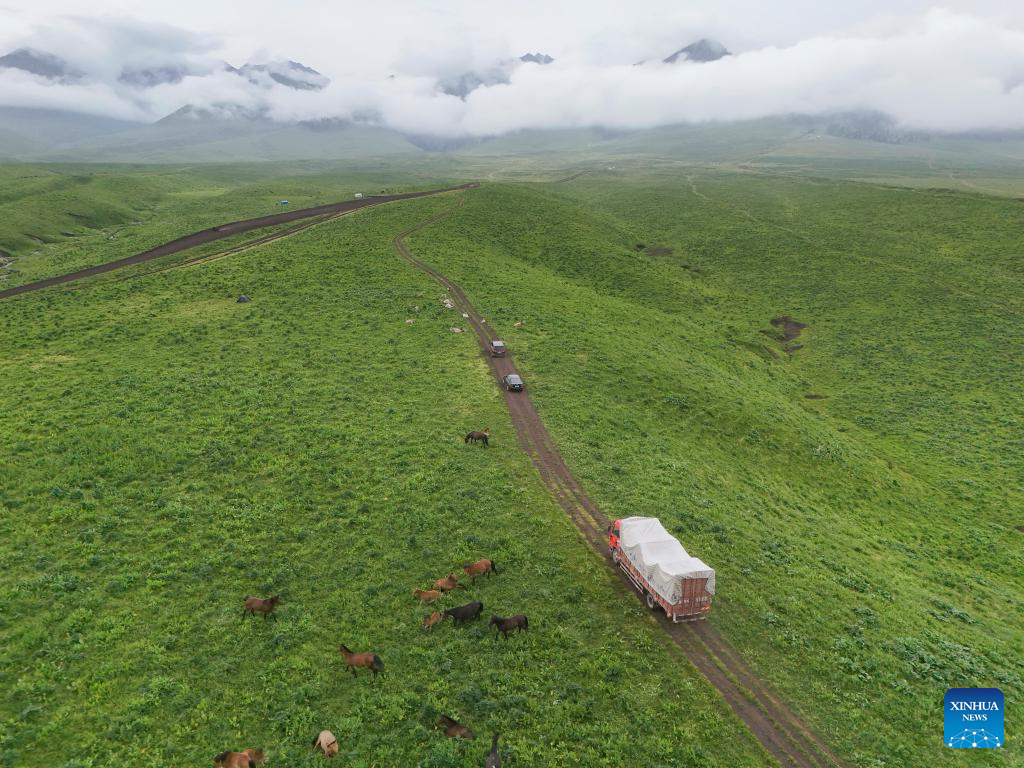
An aerial drone photo shows vehicles carrying the yurt and other materials of Balatijan Eremubai moving on grassland in Xinyuan County, northwest China's Xinjiang Uygur Autonomous Region, June 11, 2025, the second day of summer transfer. Xinjiang, home to lush pastures, is one of China's key livestock production base. The Ili River Valley on the northern slopes of the Tianshan Mountains boasts abundant grassland resources. Every June, local herders took their livestock to summer pastures at higher altitudes where grass is abundant.
Balatijan Eremubai, a 43-year-old herder, lives with his family in a village in Narat Township of Xinyuan County. As this year's summer transfer comes, Balatijan made good preparations. In the past, horses were the main form of transport for the herdsmen and their belongings, but for now driving vehicles makes the journey easier and quicker. Balatijan drove vehicles to transport belongings and his family members to the summer pasture only in two days. And he can focus on driving sheep on the third day in a traditional way.
Vehicles using facilitates the life of the herders. Meanwhile the improvement of the infrastructure in the pastoral areas has brought continuous benefits to their daily lives. At the settlement built up for herders, medical, educational and cultural services are also available.
The three-day journey was arduous, but Balatijan said such works were worthwhile. And he is confident about this year's income. (Xinhua/Hu Huhu)

An aerial drone photo shows the summer pasture where Balatijan Eremubai's family will stay in Xinyuan County, northwest China's Xinjiang Uygur Autonomous Region, June 11, 2025. Xinjiang, home to lush pastures, is one of China's key livestock production base. The Ili River Valley on the northern slopes of the Tianshan Mountains boasts abundant grassland resources. Every June, local herders took their livestock to summer pastures at higher altitudes where grass is abundant.
Balatijan Eremubai, a 43-year-old herder, lives with his family in a village in Narat Township of Xinyuan County. As this year's summer transfer comes, Balatijan made good preparations. In the past, horses were the main form of transport for the herdsmen and their belongings, but for now driving vehicles makes the journey easier and quicker. Balatijan drove vehicles to transport belongings and his family members to the summer pasture only in two days. And he can focus on driving sheep on the third day in a traditional way.
Vehicles using facilitates the life of the herders. Meanwhile the improvement of the infrastructure in the pastoral areas has brought continuous benefits to their daily lives. At the settlement built up for herders, medical, educational and cultural services are also available.
The three-day journey was arduous, but Balatijan said such works were worthwhile. And he is confident about this year's income. (Xinhua/Hu Huhu)
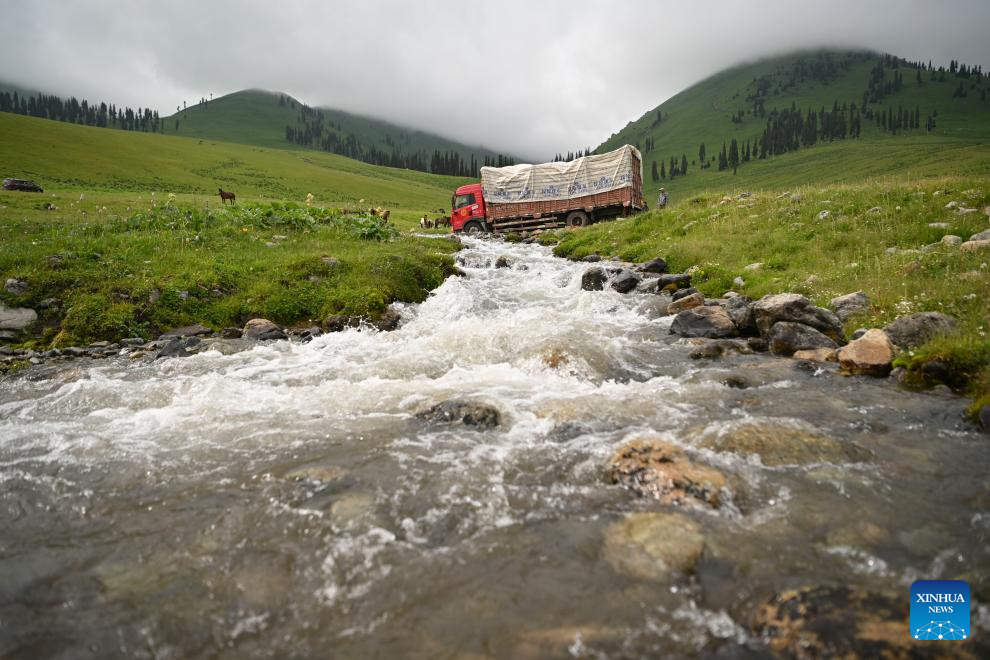
A truck carrying the yurt and other materials of Balatijan Eremubai moves on grassland in Xinyuan County, northwest China's Xinjiang Uygur Autonomous Region, June 11, 2025, the second day of summer transfer. Xinjiang, home to lush pastures, is one of China's key livestock production base. The Ili River Valley on the northern slopes of the Tianshan Mountains boasts abundant grassland resources. Every June, local herders took their livestock to summer pastures at higher altitudes where grass is abundant.
Balatijan Eremubai, a 43-year-old herder, lives with his family in a village in Narat Township of Xinyuan County. As this year's summer transfer comes, Balatijan made good preparations. In the past, horses were the main form of transport for the herdsmen and their belongings, but for now driving vehicles makes the journey easier and quicker. Balatijan drove vehicles to transport belongings and his family members to the summer pasture only in two days. And he can focus on driving sheep on the third day in a traditional way.
Vehicles using facilitates the life of the herders. Meanwhile the improvement of the infrastructure in the pastoral areas has brought continuous benefits to their daily lives. At the settlement built up for herders, medical, educational and cultural services are also available.
The three-day journey was arduous, but Balatijan said such works were worthwhile. And he is confident about this year's income. (Xinhua/Hu Huhu)
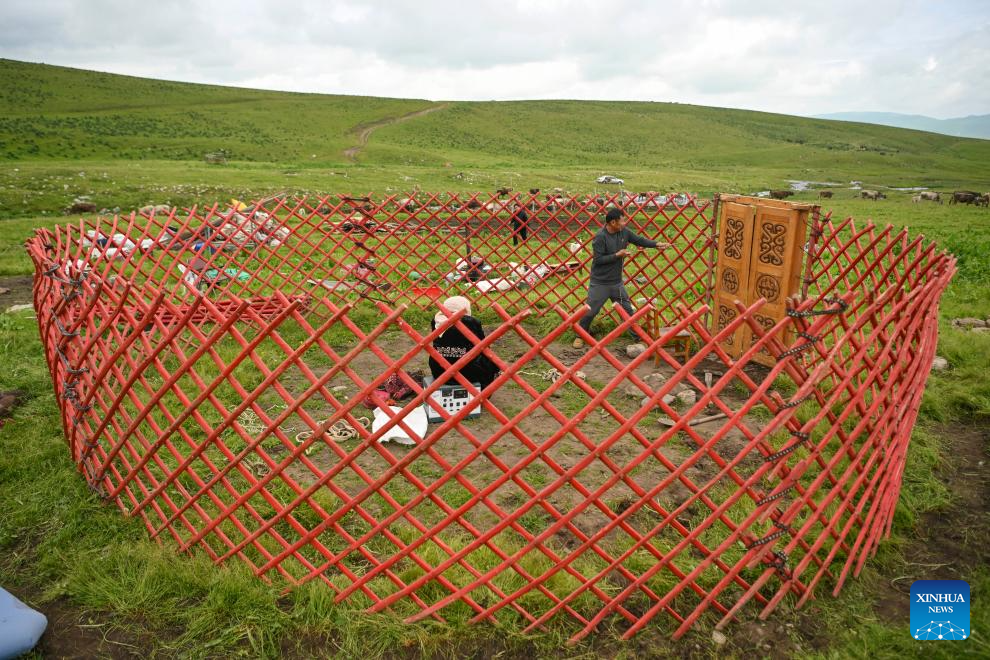
Balatijan Eremubai (R) sets up a yurt on the summer pasture in Xinyuan County, northwest China's Xinjiang Uygur Autonomous Region, June 11, 2025, the second day of summer transfer. Xinjiang, home to lush pastures, is one of China's key livestock production base. The Ili River Valley on the northern slopes of the Tianshan Mountains boasts abundant grassland resources. Every June, local herders took their livestock to summer pastures at higher altitudes where grass is abundant.
Balatijan Eremubai, a 43-year-old herder, lives with his family in a village in Narat Township of Xinyuan County. As this year's summer transfer comes, Balatijan made good preparations. In the past, horses were the main form of transport for the herdsmen and their belongings, but for now driving vehicles makes the journey easier and quicker. Balatijan drove vehicles to transport belongings and his family members to the summer pasture only in two days. And he can focus on driving sheep on the third day in a traditional way.
Vehicles using facilitates the life of the herders. Meanwhile the improvement of the infrastructure in the pastoral areas has brought continuous benefits to their daily lives. At the settlement built up for herders, medical, educational and cultural services are also available.
The three-day journey was arduous, but Balatijan said such works were worthwhile. And he is confident about this year's income. (Xinhua/Hu Huhu)

The summer pasture where Balatijan Eremubai's family will stay is pictured in Xinyuan County, northwest China's Xinjiang Uygur Autonomous Region, June 11, 2025. Xinjiang, home to lush pastures, is one of China's key livestock production base. The Ili River Valley on the northern slopes of the Tianshan Mountains boasts abundant grassland resources. Every June, local herders took their livestock to summer pastures at higher altitudes where grass is abundant.
Balatijan Eremubai, a 43-year-old herder, lives with his family in a village in Narat Township of Xinyuan County. As this year's summer transfer comes, Balatijan made good preparations. In the past, horses were the main form of transport for the herdsmen and their belongings, but for now driving vehicles makes the journey easier and quicker. Balatijan drove vehicles to transport belongings and his family members to the summer pasture only in two days. And he can focus on driving sheep on the third day in a traditional way.
Vehicles using facilitates the life of the herders. Meanwhile the improvement of the infrastructure in the pastoral areas has brought continuous benefits to their daily lives. At the settlement built up for herders, medical, educational and cultural services are also available.
The three-day journey was arduous, but Balatijan said such works were worthwhile. And he is confident about this year's income. (Xinhua/Hu Huhu)

Balatijan Eremubai rides a horse and drives sheep during his way to summer pasture, in Xinyuan County, northwest China's Xinjiang Uygur Autonomous Region, June 12, 2025, the third day of summer transfer. Xinjiang, home to lush pastures, is one of China's key livestock production base. The Ili River Valley on the northern slopes of the Tianshan Mountains boasts abundant grassland resources. Every June, local herders took their livestock to summer pastures at higher altitudes where grass is abundant.
Balatijan Eremubai, a 43-year-old herder, lives with his family in a village in Narat Township of Xinyuan County. As this year's summer transfer comes, Balatijan made good preparations. In the past, horses were the main form of transport for the herdsmen and their belongings, but for now driving vehicles makes the journey easier and quicker. Balatijan drove vehicles to transport belongings and his family members to the summer pasture only in two days. And he can focus on driving sheep on the third day in a traditional way.
Vehicles using facilitates the life of the herders. Meanwhile the improvement of the infrastructure in the pastoral areas has brought continuous benefits to their daily lives. At the settlement built up for herders, medical, educational and cultural services are also available.
The three-day journey was arduous, but Balatijan said such works were worthwhile. And he is confident about this year's income. (Xinhua/Hu Huhu)
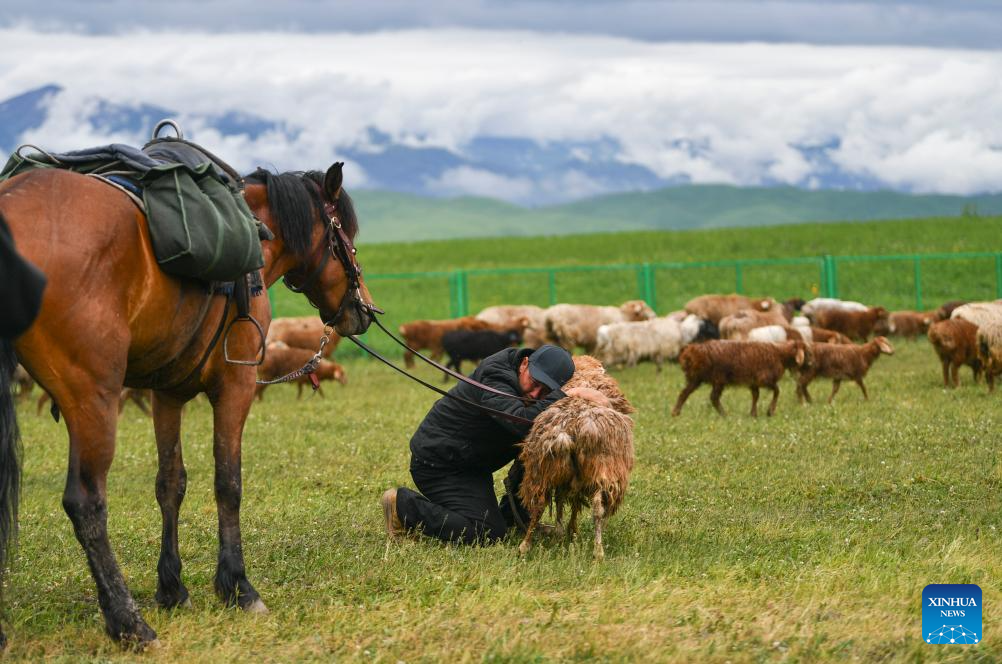
Balatijan Eremubai checks a sheep during his way to summer pasture, in Xinyuan County, northwest China's Xinjiang Uygur Autonomous Region, June 12, 2025, the third day of summer transfer. Xinjiang, home to lush pastures, is one of China's key livestock production base. The Ili River Valley on the northern slopes of the Tianshan Mountains boasts abundant grassland resources. Every June, local herders took their livestock to summer pastures at higher altitudes where grass is abundant.
Balatijan Eremubai, a 43-year-old herder, lives with his family in a village in Narat Township of Xinyuan County. As this year's summer transfer comes, Balatijan made good preparations. In the past, horses were the main form of transport for the herdsmen and their belongings, but for now driving vehicles makes the journey easier and quicker. Balatijan drove vehicles to transport belongings and his family members to the summer pasture only in two days. And he can focus on driving sheep on the third day in a traditional way.
Vehicles using facilitates the life of the herders. Meanwhile the improvement of the infrastructure in the pastoral areas has brought continuous benefits to their daily lives. At the settlement built up for herders, medical, educational and cultural services are also available.
The three-day journey was arduous, but Balatijan said such works were worthwhile. And he is confident about this year's income. (Xinhua/Hu Huhu)



